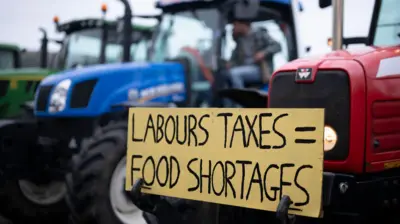We've updated our Privacy and Cookies Policy
We've made some important changes to our Privacy and Cookies Policy and we want you to know what this means for you and your data.
Barrister avoids jail over Supreme Court breach
- Author, Dominic Casciani
- Role, Home and legal correspondent
A barrister and environmental campaigner who leaked the Supreme Court's judgment on the expansion of Heathrow has avoided being jailed.
Tim Crosland is the first person to ever be tried and found in contempt of the Supreme Court - the crime of interfering with justice.
A panel of three of the court's justices has fined him ВЈ5,000 for his deliberate leak last December.
Mr Crosland said he acted to expose government "dishonesty".
Last December Mr Crosland was part of a major court battle over the government's legal approach to the potential third runway for Heathrow Airport.
He and others received a confidential draft of the judgment ahead of its publication. This is a standard step taken by judges to ensure that any small errors can be corrected.
Mr Crosland, who is a director of Plan B Earth, an environmental legal action charity, said he so objected to the court's findings that he was compelled to disclose them the day before the judgment became official.
Disclosing a judgment in such circumstances is a contempt of court because it interferes with the administration of justice.
In his statement to the media, breaking the court's embargo, he said the judgment was factually wrong and had failed to take into account the government's misrepresentation of its obligations to hit climate targets.
That statement spread across social media and was published by a number of news organisations.
Image source, Reuters
Appearing before three Supreme Court justices on Monday, Mr Crosland argued that his actions had been necessary to save lives.
He had earlier told the ґуПуґ«ГЅ that he believed going to prison was a price worth paying to highlight climate lies - and he did not believe he had committed a crime.
But fining him ВЈ5,000, Lord Lloyd-Jones said the penalty was "necessary and proportionate" to protect the integrity of the judiciary and its judgments.
"There is no such thing as a justifiable contempt of court," he said.
"It was, in the event, not necessary for him to disclose the result of the case. Once the judgment had been handed down, the parties, the public and the media were free to scrutinise the judgment and comment on it."
Speaking to the Press Association after the verdict, Mr Crosland said while he was happy to be going home, from a campaigning point of view, jail may have helped raised awareness of the climate crisis and the government's role in it.
He now faces being thrown out of his profession and his charity is also under official investigation.
He has lodged an appeal but the case is so unique that nobody - including the Supreme Court - knows how that will even work.
Top Stories
More to explore
Most read
Content is not available








